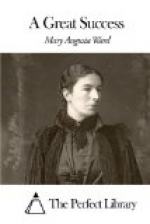Doris, for instance, with other guests, expressed a wish to attend morning service on Sunday at a famous cathedral some three miles away. Lady Dunstable immediately announced that everybody who wished to go to church would go to the village church within the park, for which alone carriages would be provided. Then Doris and Sir Luke combined, and walked to the cathedral, three miles there and three miles back—to the huge delight of the other and more docile guests. Sunday evening, again, was devastated by what were called “games” at Crosby Ledgers. “Gad, if I wouldn’t sooner go in for the Indian Civil again!” said Sir Luke. Doris, with the most ingratiating manner, but quite firmly, begged to be excused. Lady Dunstable bit her lip, and presently, a propos de bottes, launched some observations on the need of co-operation in society. It was shirking—refusing to take a hand, to do one’s best—false shame, indeed!—that ruined English society and English talk. Let everybody take a lesson from the French! After which the lists were opened, so to speak, and Lady Dunstable, Meadows, the Dean, and about half the young people produced elegant pieces of translation, astounding copies of impromptu verse, essays in all the leading styles of the day, and riddles by the score. The Home Secretary, who had been lassoed by his hostess, escaped towards the middle of the ordeal, and wandered sadly into a further room where Doris sat chatting with Lord Dunstable. He was carrying various slips of paper in his hand, and asked her distractedly if she could throw any light on the question—“Why is Lord Salisbury like a poker?”
“I can’t think of anything to say,” he said helplessly, “except ’because they are both upright.’ And here’s another—’Why is the Pope like a thermometer?’ I did see some light on that!” His countenance cheered a little. “Would this do? ’Because both are higher in Italy than in England.’ Not very good!—but I must think of something.”
Doris put her wits to his. Between them they polished the riddle; but by the time it was done the Home Secretary had begun to find Meadows’s little wife, whose existence he had not noticed hitherto, more agreeable than Lady Dunstable’s table with its racked countenances, and its too ample supply of pencils and paper. A deadly crime! When Lady Dunstable, on the stroke of midnight, swept through the rooms to gather her guests for bed, she cast a withering glance on Doris and her companion.
“So you despised our little amusements?” she said, as she handed Mrs. Meadows her candle.
“I wasn’t worthy of them,” smiled Doris, in reply.
* * * * *
“Well, I call that a delightful visit!” said Meadows as the train next morning pulled out of the Crosby Ledgers station for London. “I feel freshened up all over.”




